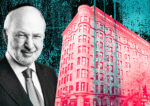An owner with repeat appearances on New York City “worst landlords” lists and years of housing citations has received one of the most generous tax breaks every awarded by the city at a Brooklyn development with thousands of violations.
David Bistricer’s Clipper Equity landed the exemption, worth an estimated $191 million over 40 years, intended for improvements to Flatbush Gardens, a development of 2,494 rent-stabilized units in East Flatbush with nearly 3,000 open housing code violations.
The break, granted by unanimous approval by the New York City Council in June and first reported by The City, also calls for 250 units to be set aside for the homeless. The deal would ensure the “substantial rehabilitation” of the properties and to maintain affordability at the roughly 75-year-old development, which consists of 252 studios, 1,024 one-bedroom units, 1,107 two-bedrooms and 111 three-bedrooms.
A Clipper spokesperson said the complex is not crumbling, but city documents estimated that $27 million in “critical and immediate rehabilitation work” is needed including repairs, replacements and upgrades to elevators, roofs, common areas, boiler systems and apartment kitchens and bathrooms.
The rest of the $191 million in savings accounts for future maintenance, a spokesperson for the New York City Department of Housing Preservation and Development told The Real Deal.
Just some violations among the complex’s 59 buildings include mold, roaches, rodents, lead paint and rotting windows. There are 998 Class C, 1528 Class B and 462 Class A open housing code violations to date, according to city documents.
“In this case, with complex-wide repairs … you can do quick fixes, but if you’re not replacing a roof that is crumbling, these problems will come back,” a spokesperson for the HPD said.
Tools will be in place to ensure all the violations are corrected and the certifications are accurate, according to the department. If ample repairs aren’t done, the tax break can be suspended or revoked, or the property manager replaced.
“There’s a lot of things that we’ll be able to do now, and because now we’re in this relationship with them, we’ll have access to the buildings and the owners and the property management to ensure that all of the issues are getting addressed,” the spokesperson said.
Borough Park-based Clipper, which has owned the buildings since acquiring them in 2005 for $138.2 million from a California pension fund, was named one of the worst NYC landlords in 2010 and again in 2022. The Clipper spokesperson said when the firm bought Flatbush Gardens, “all critical systems were either broken or in severe disrepair” and it had 14,000 violations, which Clipper has worked to remedy “wherever possible.”
The firm has invested $90 million into the complex since purchasing it, the spokesperson said, adding that occupancy is 96 percent, and more than 90 percent of its 2,400 tenants pay rent regularly. The Real Deal reported in September that Clipper is looking to sell Flatbush Gardens for about $425 million.
When Clipper vied for Starrett City, a 5,881-apartment in Brooklyn and the country’s largest federally subsidized housing development, then-Attorney General Andrew Cuomo opposed the bid, saying Bistricer had a “long and troubled history of tenant abuse.” Officials later blocked the $1.3 billion purchase amid concerns that it could deprive tenants of vital affordable housing.
A video of a listing at one of Bistricer’s properties on the Upper West Side went viral on TikTok this summer after a woman touring a vacant apartment noticed crackling walls, bug carcasses and brown grime in the toilet.
This isn’t the first time Flatbush Gardens has made headlines: Video footage of the complex went viral in 2010 for capturing violations that “run the gamut,” a spokesperson for HPD said. After the property garnered garnered 400 new violations in a month and a half, the spokesperson said the city is “very aware of these buildings … we’re out there frequently.”
The next year, federal labor investigators said they were considering charging Bistricer for illegally locking out 70 workers from Flatbush Gardens. It appears he was never formally charged, but the New York Daily News reported a judge later ordered him to let the workers return after a 16-month lockout.
Clipper in 2018 received a $246 million loan from New York Community Bank to replace debt on Flatbush Gardens. At the time, the company had paid off mortgage loans of about $168 million on the development, with the refinancing lowering its interest rates and providing added liquidity.
This article has been updated with comments from Clipper Equity.
Read more



